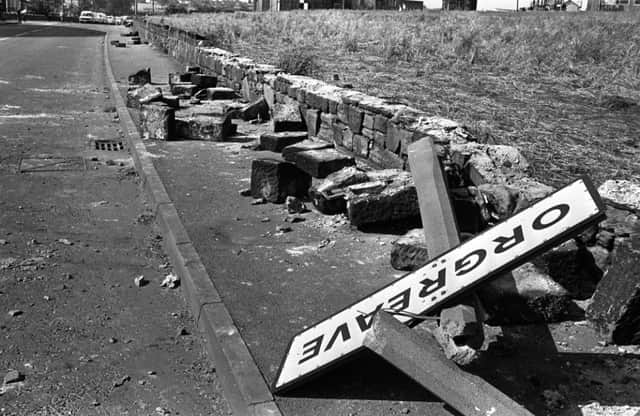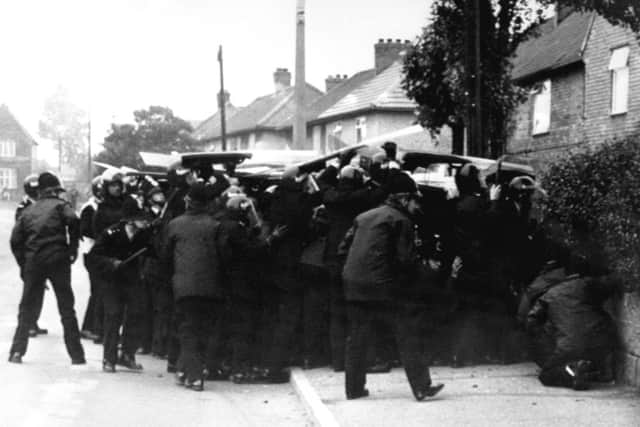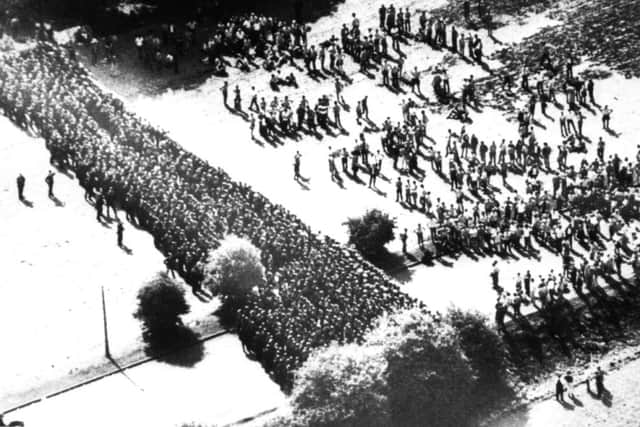Comment: could miners’ strike have been avoided?


Last weekend, I decided to clear out the stone chips between the concrete slabs in my driveway in preparation for a fresh new batch. Solent gold is out, to be replaced by the stark, chalky whiteness of Cotswold Buff.
On paper, it seemed simple enough: shovel up the old chips into rubble sacks and dig down a couple of inches to ensure that the new chips, once in place, sat flush with the paving stones. I figured it would take a couple of hours at the most. The military believes that no plan survives first contact with the enemy, and so I discovered as I dug away for five or six hours at chips entrenched in packed soil. Five minutes of digging equalled ten minutes of panting. Digging is hard work for the novice and two days later, by which time I’d filled 60 rubble sacks with stones and earth, my back, shoulders and stomach were aching and I was on a diet of Nurofen Plus and hot baths.
Advertisement
Hide AdAdvertisement
Hide AdWe rarely get the opportunity to walk a mile in another man’s shoes, but if I was almost beaten by a driveway, I dread to think of my prospects down a pit. How did they do it? Kneeling at a coal face, wielding a pick-axe and shovel for eight hours a day, breathing in stour and listening for any creak or splinter in the knowledge that one mile of earth and rock sat in cruel judgment above them. Today the description “a hard man” has been contaminated with allusions to violence and criminality; previously it was a statement of fact: wiry men knotted with muscles and a granite resolve, and at that time the hardiest “hard man” was a miner. To say they don’t make men like that any more is a simple truth. There are no mines left, at least not in Scotland.


Thirty years ago this week, the miners’ strike began, and with it the beginning of the end of an industry that stretches back to the Middle Ages and which, during the industrial revolution, powered Britain to greatness. In Scotland, the coal seam is just 30 miles wide and runs in a diagonal slash across the country from the Firth of Forth down to the Ayrshire coast. Today, former miners enjoy a unique respect earned through the danger and difficulty of the job, but for 150 years, between 1606 and 1760, miners and their children were serfs, effectively property of the colliery owner who would pursue runaways. Even after the abolition of laws, the trade carried the stigma of slavery, and it was only at the turn of the 20th century that genuine pride in the profession emerged.
Drilling down through the past three decades, what do we learn about the “strike to end all strikes”? At the beginning of 1984, there were 174 working mines in Britain, 12 in Scotland, and this nationalised industry was making a loss. While the French government was content to subsidise coal mining at a cost of £19 a ton and the Germans £12 a ton, Margaret Thatcher considered the British subsidy of £4 a ton too high and brought in Ian MacGregor, the Scots-born, American- educated head of British Steel to run the National Coal Board and close loss-making pits. At British Steel, MacGregor earned the monicker “Mac the Knife” for returning the industry to profitability at a cost of 65,000 jobs, and his plans for British coal were no less bloody. His initial plan was to cut the workforce, then standing at 202,000, by 44,000 in two years and then by a further 20,000.
Standing in opposition to the government’s plans was Arthur Scargill, head of the National Union of Mineworkers, the most powerful and, until 1984, successful union in Britain. A former Communist, Scargill believed no mine should ever be closed on grounds of unprofitability, even if the coal seam was exhausted. Victories past had convinced him that he had the power to defeat the government. In 1972, he had led mass pickets at the Saltley Coke Depot which he described as “the greatest day of my life” when miners launched the first mass strike since the 1920s to demand a 45 per cent pay rise. Edward Heath, the Conservative prime minister, feared civil unrest and quickly capitulated, though the wage rise secured was 20 per cent.
In 1981, Thatcher herself had agreed terms with the NUM to avoid another strike, in the knowledge they were unprepared for conflict, but over the next two years, energy secretary Nigel Lawson began quietly stockpiling coal supplies for power stations in preparation for any future strike.


Yet what is often forgotten is the general reluctance of the majority of miners to strike until forced by peer pressure and the stigma of being called a scab. Scargill was aware that if he balloted every miner in Britain to approve a national strike, he would lose. But democracy would not stand in his way; instead, he relied on the NUM’s Rule 41, which allowed different mining areas to call their men out on strike “with or without a ballot”. On 6 March, 1984, the NCB announced plans to close 20 coal mines, including Polmaise in Scotland, with a loss of 20,000 jobs. Scargill said this was only the beginning and that the government had a hit list of 70 coal mines. In an act of clear deceit, MacGregor denied this and wrote to every NUM member stating that their leader was lying. However, Cabinet papers released earlier this year under the 30-year rule showed that the NCB and government had actually targeted 75 for closure over three years.
In less than a month, four out of five miners were on strike and the ugliest industrial dispute in decades was under way. The clear facts are that Scargill led his men into a battle they could never win. Ill-informed and unaware of the extent of the government’s stockpiles, the NUM leader expected capitulation within weeks, but warmer weather reduced coal demand even further and so stretched out heaped supplies. As the strike was viewed as illegal – except in Scotland, where the High Court accepted that a show of hands had taken place – social security payments were withheld, forcing miners’ families into poverty, while new legislation prohibiting secondary picketing led to violent confrontations with police forces who were battle-hardened by the riots of Toxteth and Brixton and newly equipped with riot gear.
Dark plumes of hatred covered the country. Miners against the police. Police against the miners. Miners versus scab. Scargill against Thatcher. Neil Kinnock against Scargill, whom he believed to be betraying an industry. It was a clash of ideologies between two leaders with violently opposing views. Mrs Thatcher would later write: “What the strike’s defeat established was that Britain could not be made ungovernable by the Fascist Left. Marxists wanted to defy the law of the land in order to defy the laws of economics. They failed and in doing so demonstrated just how mutually dependent the free economy and a free society really are.”
Advertisement
Hide AdAdvertisement
Hide AdThe miners’ strike forged a generation who came of age among the turmoil and led them to distrust the police, despise the government of Mrs Thatcher and maintain an unflinching respect for the men who only returned to work in March 1985 after a special delegate conference of the NUM agreed that they should walk back through the gates with “heads held high”. In truth, it was an utter defeat – a year at the picket lines had achieved nothing.
Today, should we mourn the loss of an industry that took such a heavy toll on the health of its practitioners? For even in the midst of the strike, there were miners who did not wish to see their sons follow them and their grandfathers down into the bowels of the earth. It is an argument with which I’ve a great deal of sympathy, but it is a difficult circle to square when Britain still relies so heavily on coal to fire 40 per cent of our power stations, coal we now import from abroad while millions of tons still lie underground.
Then there are the consequences for the health of a community when faced with long-term unemployment: was this any better? Looking back, you can’t help but ask the question: could the reduction of our coal industry have been achieved more sympathetically, with an understanding eye on those communities at whose heart lay a pit? Yes, but this would have required Arthur Scargill and Margaret Thatcher to have left the stage, so the answer, as history has shown, is No and, as a consequence, tens of thousands of good men were crushed between an implacable force and, for a year, an immovable object.